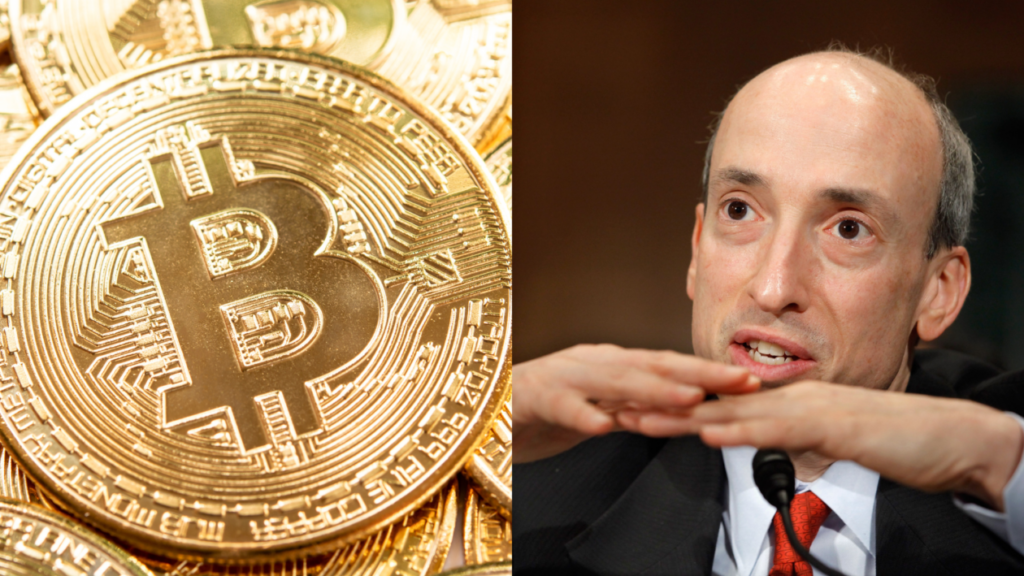-
Two prominent Democratic senators have voiced their concerns directly to Gary Gensler, urging a halt to the further approval of crypto ETFs.
-
The recent green light by the SEC for spot Bitcoin ETFs has sparked a debate on whether this could set a new standard for the approval of similar financial products.
-
As Gary Gensler and the SEC scrutinize ETFs, their decisions will set precedents that could shape the regulatory landscape for years to come.
In the fast-evolving landscape of cryptocurrency, the integration of exchange-traded funds (ETFs) has become a focal point of debate among investors, regulators, and legislators alike.
The spotlight shines on Gary Gensler, the chair of the Securities and Exchange Commission (SEC), as political pressures mount over the potential SEC approval of more crypto ETFs.
Navigating the Future of Crypto ETFs: A Regulatory Perspective
Two prominent Democratic senators have voiced their concerns directly to Gary Gensler, urging a halt to the further approval of ETFs. Senators Jack Reed and Laphonza Butler, in a letter dated March 11, argue that such approvals could significantly expose investors to the myriad risks associated with digital currencies, including market manipulation and fraud.
These concerns are magnified by the prospect of eight proposed spot Ether ETFs awaiting SEC approval. The senators’ apprehensions extend beyond Bitcoin, suggesting that the approval of ETFs for other cryptocurrencies could introduce retail investors to even higher risks, given the volatility and susceptibility of these markets to illicit activities.

The senators’ call to action is not without precedent. The recent green light by the SEC for spot Bitcoin ETFs has sparked a debate on whether this could set a new standard for the approval of similar financial products. Despite Bitcoin’s established market presence, the senators highlight its vulnerabilities and argue that other digital currencies are even more at risk.
Regulatory Scrutiny and Legislative Efforts
Amidst these discussions, the importance of anti-money laundering (AML) and know-your-customer (KYC) regulations has come to the fore. Senators Reed and Butler’s legislative activities underscore their commitment to tightening these regulatory frameworks, especially within the realm of decentralized finance (DeFi).
The senators have been instrumental in pushing for legislation aimed at enhancing AML and KYC measures across the cryptocurrency sector. Notably, their involvement in the controversial Digital Asset Anti-Money Laundering Act bill, co-sponsored by Senator Elizabeth Warren, highlights their stance on the need for stringent regulatory oversight.
Also, Read Omega Secures $6 Million in Funding to Revolutionize Bitcoin’s Role in DeFi.
Their efforts are indicative of a broader regulatory trend focusing on safeguarding investors and ensuring the integrity of the cryptocurrency market. The call for enhanced scrutiny over already launched Bitcoin ETF products, including demands for brokers and advisors to face additional regulations, reflects a cautious approach to cryptocurrency investment vehicles.
The Path Forward for ETFs and Regulation
The dialogue surrounding the approval of ETFs and the regulatory landscape encapsulates a critical juncture for the cryptocurrency market. The potential impact of further SEC approvals on investor safety and market stability cannot be understated. With Gary Gensler at the helm, the SEC finds itself at the intersection of innovation and investor protection.
As the debate continues, the cryptocurrency community and its observers await with bated breath. The outcomes of these discussions could define the trajectory of crypto ETFs and the broader acceptance of cryptocurrencies within the regulated financial ecosystem. The emphasis on anti-money laundering and know-your-customer measures is a testament to the regulatory challenges that lie ahead.
To further elaborate and enrich the article with an additional 300 words, focusing on the nuances of the regulatory landscape, investor implications, and the broader impact on the cryptocurrency market, we delve deeper into the discussion:
The stance taken by Senators Reed and Butler underscores a growing concern within regulatory and legislative circles about the rapid expansion of cryptocurrency and its derivatives, such as crypto ETFs. This apprehension is grounded in the volatile nature of digital assets and the nascent regulatory framework that currently surrounds them.
Gary Gensler and the SEC play pivotal roles in navigating this complex terrain, balancing the promise of innovation against the imperative of investor protection.
Enhancing Investor Safeguards
The call for stringent anti-money laundering (AML) and know-your-customer (KYC) measures is more than a regulatory mandate; it’s a fundamental step towards legitimizing cryptocurrency investments and ensuring they align with global financial standards.
By tightening these regulations, the SEC aims to deter illicit activities and provide a safer investment environment, which in turn could bolster investor confidence in crypto ETFs and the broader crypto market.
The Future of Cryptocurrency Regulation
As the dialogue around the SEC approval of ETFs continues, the cryptocurrency community is keenly aware of the implications such decisions hold for the future.
The potential for regulatory frameworks to evolve in response to these discussions offers a glimpse into a future where digital assets could become an integral part of diversified investment portfolios, provided they are regulated in a manner that ensures market stability and investor safety.
Bridging the Innovation-Regulation Gap
The intersection of innovation and regulation presents unique challenges and opportunities for the cryptocurrency sector. As Gary Gensler and the SEC scrutinize ETFs, their decisions will set precedents that could shape the regulatory landscape for years to come.
Also, Read Matrixport Predicts US SEC’s Rejection of Bitcoin Spot ETF Proposals.
It’s an opportunity to establish a regulatory environment that not only protects investors but also fosters innovation, ensuring that the United States remains at the forefront of digital asset development and integration into the global financial system.
In conclusion, the debate over ETFs, anti-money laundering protocols, and know-your-customer regulations is indicative of the broader conversation on how to effectively regulate a rapidly evolving digital asset market.
The actions taken by the SEC under Gary Gensler’s leadership will be instrumental in defining the path forward for cryptocurrencies and their acceptance within the regulatory and investment communities.
